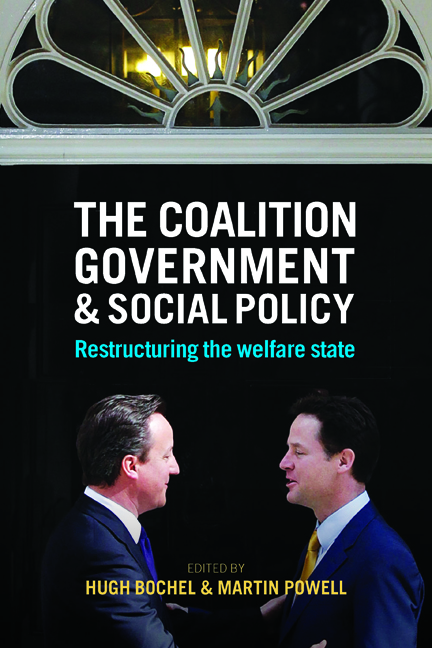Book contents
- Frontmatter
- Contents
- Notes on contributors
- One The transformation of the welfare state? The Conservative–Liberal Democrat coalition government and social policy
- Two The coalition government, public spending and social policy
- Three The changing governance of social policy
- Four The coalition, social policy and public opinion
- Five Health policy and the coalition government
- Six The coalition government, the general election and the policy ratchet in education: a reflection on the ‘ghosts’ of policy past, present and yet to come
- Seven Coalition housing policy in England
- Eight Social security under the coalition and Conservatives: shredding the system for people of working age; privileging pensioners
- Nine Welfare and active labour market policies in the UK: the coalition government approach
- Ten ‘It ain’t what you do, it’s the way that you do it’: adult social care under the coalition
- Eleven Family policy: the Mods and Rockers
- Twelve One step forward, two steps back: children, young people and the Conservative–Liberal Democrat coalition
- Thirteen The coalition and criminal justice
- Fourteen Equalities: the impact of welfare reform and austerity by gender, disability and age
- Fifteen Social policy, the devolved administrations and the UK coalition government
- Sixteen Conclusions
- Index
Ten - ‘It ain’t what you do, it’s the way that you do it’: adult social care under the coalition
Published online by Cambridge University Press: 01 September 2022
- Frontmatter
- Contents
- Notes on contributors
- One The transformation of the welfare state? The Conservative–Liberal Democrat coalition government and social policy
- Two The coalition government, public spending and social policy
- Three The changing governance of social policy
- Four The coalition, social policy and public opinion
- Five Health policy and the coalition government
- Six The coalition government, the general election and the policy ratchet in education: a reflection on the ‘ghosts’ of policy past, present and yet to come
- Seven Coalition housing policy in England
- Eight Social security under the coalition and Conservatives: shredding the system for people of working age; privileging pensioners
- Nine Welfare and active labour market policies in the UK: the coalition government approach
- Ten ‘It ain’t what you do, it’s the way that you do it’: adult social care under the coalition
- Eleven Family policy: the Mods and Rockers
- Twelve One step forward, two steps back: children, young people and the Conservative–Liberal Democrat coalition
- Thirteen The coalition and criminal justice
- Fourteen Equalities: the impact of welfare reform and austerity by gender, disability and age
- Fifteen Social policy, the devolved administrations and the UK coalition government
- Sixteen Conclusions
- Index
Summary
Introduction
‘Adult social care’ is a broad term to describe the practical assistance that is provided to people over the age of 18 who are assessed by a social worker as needing various forms of care and support. This can often be to do with activities of daily living, such as getting up, getting washed, eating and other personal care needs. Typically, groups of people using such services include older people, disabled people, people with mental health problems and people with learning difficulties, and traditional services have often taken the form of home care, day care, meals services and residential care. Whereas a qualified social worker would typically assess people's need for support, any subsequent services might be provided by social care providers in the public, private or voluntary sector. Given that so much care and support is provided within families, adult social care also works with family carers to help meet their needs and those of the person being cared for. However, issues such as child protection, work with so-called ‘troubled families’ and welfare rights advice would typically be provided by other services, and these are covered elsewhere in this book.
Of all the service areas explored in this edited collection, adult social care is arguably one of the most neglected and the least well understood. While the National Health Service (NHS), for example, is usually seen as a service that provides care to people when they are most in need, adult social care has tended to have a more mixed reputation, based on a combination of ‘care’ but also of state ‘control’. With origins in the Poor Law and in the workhouse, it is based, in part, on a history of stigma, of segregation and of potentially very intrusive attempts to distinguish between ‘deserving’ and ‘undeserving’ poverty (for an overview of the history and nature of adult social care, see Means and Smith, 1998; Means et al, 2002; Payne, 2005; Glasby, 2012). Whereas health services are provided free at the point of delivery to people we see as being ‘sick’, people who are somehow merely frail or disabled are left to rely on local authority adult social care services, which are means-tested and typically incur significant user charges.
- Type
- Chapter
- Information
- The Coalition Government and Social PolicyRestructuring the Welfare State, pp. 221 - 242Publisher: Bristol University PressPrint publication year: 2016



